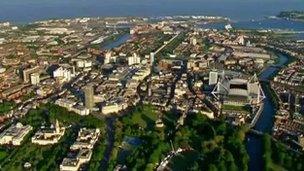Labour AM and MP attack 'flawed' plan to expand Cardiff
- Published

Cardiff council's proposals include more than 45,000 new homes
Two Labour politicians have criticised their own party's plans for a big expansion of Cardiff.
MP Kevin Brennan and AM Mark Drakeford say they are "highly sceptical" about a proposal by the city's Labour-run council to build 45,400 new homes.
They say it could increase traffic congestion and deprive Cardiff of its reputation as a good place to live.
Cardiff council said it was preparing to meet the city's future needs in the most sustainable way.
The authority's draft Local Development Plan (LDP) preferred strategy, external would involve the biggest expansion of the city for more than half a century.
The biggest single proposal is for 7,500 homes in a new suburb west of Pentrebane and about 6,000 and 2,000 earmarked either side of Pontprennau.
A further 2,000 homes could be built on land north of junction 33 on the M4.
In a written response to the strategy, Mr Brennan and Mr Drakeford - the MP and AM for Cardiff West - say they are "thoroughly unconvinced" by the scale of the house building envisaged.
They say the plans "seriously overestimate" the amount of housing that should be built on greenfield sites, and where green land is required the strategy does not make a convincing case for the sites identified.
'Flawed'
"Only when every possibility for brownfield site development has been exhausted should, we believe, attention shift to greenfield areas," they say.
They also accuse the LDP of failing to address the need for new public transport, health, education and recreation facilities, and say proposals for their own constituency are "flawed".
Building new homes in the north-west of the city and more offices in the east will mean drivers use the M4 for short journeys across Cardiff, "causing jams and tail-backs on the motorway itself".
"A city in which high levels of congestion are a regular experience for its residents is one which will quickly lose its reputation as a good place to live," they say.
"The current strategy puts at risk precisely the qualities which have made Cardiff a success."
They say the draft LDP, which was agreed by councillors in October, threatens to add 113,000 people to Cardiff's population - equivalent to a city the size of Cambridge.
A grim outlook for the economy means the population of the city is unlikely to continue growing at the rate it did over the last decade, they say.
The pair agree Cardiff needs an LDP and say their surgeries are "dominated" by constituents who cannot find homes. But they blame the lack of finance, not land, for the problem.
Mr Brennan and Mr Drakeford say a city-region approach, in line with Welsh government thinking, should be adopted to meet Cardiff's housing needs.
Their document points out that many of the people who work in Cardiff are commuters who live outside the city, and that a decision to electrify rail lines in the South Wales Valleys will improve transport into the city.
'Appropriate'
In a statement, the council said about 60% of the proposed homes would be on brownfield sites.
All responses to a consultation on the strategy would be carefully considered before the next version of the LDP is considered by the council in September 2013, it said.
Deputy council leader Ralph Cook said: "I very much appreciate the recognition of the need to prepare an LDP for Cardiff and aim to prepare a plan which meets future development needs in the most sustainable and appropriate way which is good for Cardiff, good for the region and meets the LDP tests of soundness."
He said the failure to produce a plan previously had left Cardiff vulnerable to a "developer-led free for all where the council and local communities have limited control on the location, quality and facilities provided by new development".
Mr Cook has previously said there was evidence to show Cardiff's population was "about ready to grow" and there was a pent-up demand for housing in the city, with at least 10,000 families on the waiting list.
- Published2 November 2012
- Published25 October 2012
- Published13 July 2012